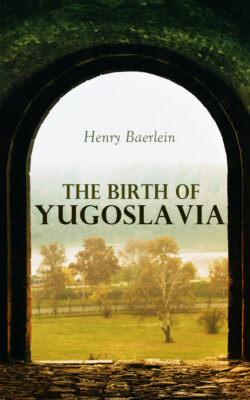Читать книгу The Birth of Yugoslavia - Henry Baerlein - Страница 41
На сайте Литреса книга снята с продажи.
SERBS ASSIST THE BULGARIAN RENASCENCE
ОглавлениеWhile the Serbs were flourishing, ecclesiastically, in the Banat, the Bulgars had been painfully keeping alive, until 1767, their lonely Patriarchate at Ochrida. Time and again the Greek Patriarch at Constantinople had tried to suppress it, at first on account of cupidity and afterwards, say the Bulgars, for fear lest it should help to arouse the Bulgarian national spirit; but that spirit had fallen to such a depth that the second edition of a comparative lexicon of the Slav languages, which was issued, at the behest of the Empress Catharine in 1791, makes no mention of Bulgarian, and in 1814 the Slavist Dobrovsky regarded Bulgarian as a form of Serbian. And yet, say the Bulgars, the national spirit survived so wonderfully by those far waters of Macedonia that even when the Greek language was introduced into the offices and the Church administration, and when Greeks had usurped the throne of St. Clement, they still found it possible to stand out for the independence of their Church, which handed on the memories of the Bulgarian past. We must be allowed to be sceptical—the town of Ochrida in the fifteenth, sixteenth and seventeenth centuries is said by contemporary writers to be now in Serbian, now in Bulgarian, now in Macedonian territory. And the very observant Patriarch Brkić of the eighteenth century tells us, in a calm, passionless description of the diocese, which he wrote in exile—he was the last Patriarch of Peć—that the inhabitants of a place called Rekalije, in the district of Djakovica, are not Albanians but Serbs and Bulgars who had been, a short time before, converted to Islam. It seems probable that the sharp divisions of Serb, Bulgar, and so on, did not then exist, and that the Greek Patriarch at Constantinople did himself not know what variety of reprehensible Slav it was that lived in those parts. … The last Patriarch of Ochrida, whose name was likewise Arsenius, spent the remainder of his life in exile at Mt. Athos, and there, in another monastery, was a pale, sickly monk, poring over crabbed MSS. This Païssu, a Bulgar, had entered, like his elder brother, the great Serbian monastery of Hilendar. We know from him that while the various Orthodox monks of Mt. Athos—Greeks, Bulgars, Russians, Serbs and Vlachs—were frequently at loggerheads, yet the others even more frequently combined to fall upon the Bulgars and to upbraid them because their history had not been glorious and because they had an insufficient number of saints. The Bulgar was nothing but a servant of the Greek; Bulgarian was no doubt written in a monastery here and there, but as for the spoken language, were not the townsfolk often ashamed of it? Did they not prefer to talk Greek? "I was filled with sadness," says Païssu, "on account of my race." There happened to be at Hilendar the monk Obradović, who was less enthusiastic about Glagolitic than about the songs sung by the peasant. With the fundamental thought of working for the whole people, including the women, he clung to the idea of a literature in the popular, rather than in the old Church language. He was to set out, in pursuit of Western science, to France and Italy and England—he spent six months in London. The whole people was dear to him; he looked beyond their differences of religion, their other differences, and saw the brotherhood, in race and speech, of all the Southern Slav countries. He was to become one of the great inspirers of modern Serbia and her first Minister of Education.[33] He urged young Païssu to travel among his countrymen in search of manuscripts and legends. If only he could find the buried splendour of his people and call it into life again. And before he died—he suffered from continual headaches and an internal malady—he had finished, in 1762, his book, Slav-Bulgarian History of the Bulgarian People and Rulers and Saints. This naif, imperfect book, more lyric than scientific, but sincere and impassioned, has played a part in reminding the Bulgars of their story; it is the fountain-head of the Bulgarian Renascence.
In Serbia the gallant Captain Kotča also tried to begin for his country a Renascence. Russia and Austria declared war against the Turks in 1787. The Serbian volunteers, who included Kara George, crossed the Danube and fought with great courage. Yet the Austrians were beaten and Kotča was captured, by treachery, in the Banat; he was brought back to Serbia and impaled with sixty of his comrades. But in the treaty of 1791 the Turks undertook to give autonomy to the Serbs of the Pashalik of Belgrade, and to keep from their lands in future the janissaries who had wrought so much mischief.
